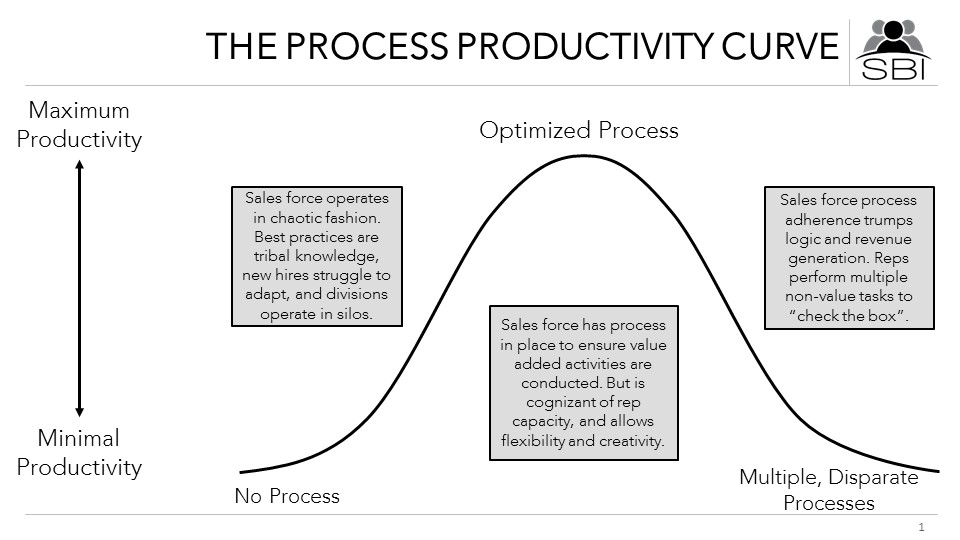“I should have been a stenographer,” the sales rep told me. He was punching in results from a sales call.
“How long does this typically take you?” I asked.

“After a sales call, about 30 minutes. But it also takes 30 minutes to fill in the pre-sales call paperwork”. The rep looked up from his computer, “Don’t worry, I manage to sneak some sales calls in-between this”.
This sales force was suffering from process overload. Their SVP had purchased an “out of the box” sales process. The paperwork made insurance applications seem concise. He had been told that the proprietary system wouldn’t work unless it was fully implemented. So management forsaked coaching and stressed completion and adeherence.
It had been 6 months since rollout. But the promised improvements never materialized.
Processes in the sales force are usually met with rolling eyes and smirks. Reps think they are belittling and bureaucratic. Some are. But we’ve also helped organizations accelerate revenues by turning critical activity into company policy. The key is to ensure each component of the process actually adds value.
Download Our Sales Force Process Improvement 10 point checklist. Examine your processes today and ensure your team is spending effort on the right activities.
Many times, the pendulum swings too far. The result is a department incapable of creative and independent thinking. Reps spend the majority of their time on fruitless activities. Managers become compliance officers. When this occurs, moral plummets and sales stagnate.
Here are three signs that your processes are overgrown:
Multiple Programs and Applications: If Sales Reps have to handle more than 2 disparate software programs, it’s too much. One organization we witnessed requested reps log into 5 applications per working day. Most reps only logged their daily activities into the CRM. Then on Fridays they drudged through the mandatory updates on the other systems. None of these systems were adding any value. They were just a check the box activity.
The Exception Process: Many processes within sales are developed to ensure critical steps aren’t missed. In the worst cases, the definition of “critical” slowly gets expanded. The thinking goes like this:
John lost a deal because of “X”. Therefore, we need a mitigation step for “X”.
The result is an exception driven process that sucks all the life out of reps. It treats them like robots, and undermines their creativity. Sure, there needs to be rails and guidelines. But if it becomes a straightjacket, you’re hindering your reps. And they will feel strangled.
 Paperwork Overload: Paperwork overload begins with good intentions. “We want our reps to think before they meet the customer”. Just a brief form. Two years later, the documentation has ballooned into a novel. Now you’re paying for secretaries with a secondary job of revenue creation.
Paperwork Overload: Paperwork overload begins with good intentions. “We want our reps to think before they meet the customer”. Just a brief form. Two years later, the documentation has ballooned into a novel. Now you’re paying for secretaries with a secondary job of revenue creation.
Processes within organizations aren’t bad. In fact, the best sales organizations have mastered process creation. If you’re implementing or maintaining one, remember these things.
It must be…
- Routinely updated and trimmed – Add components that are tribally producing positive results Take out parts that aren’t adding value.
- Flexible – Trust your reps’ judgment. Allow managers to differ from the plan when the situation is unique. But if this becomes the status quo, see number #1.
- Easy to Use and Understand – If you can’t explain it to a 5th grader, don’t expect your reps to follow it.
- Adding value to the company – Your organization may not realize benefits in the first 3 months. But if there are no positive leading indicators in 6 months, it needs to change.
Ensure your organization is operating as effectively as possible. Download our Process Improvement Checklist. Ensure your team is spending effort on the right activities.




